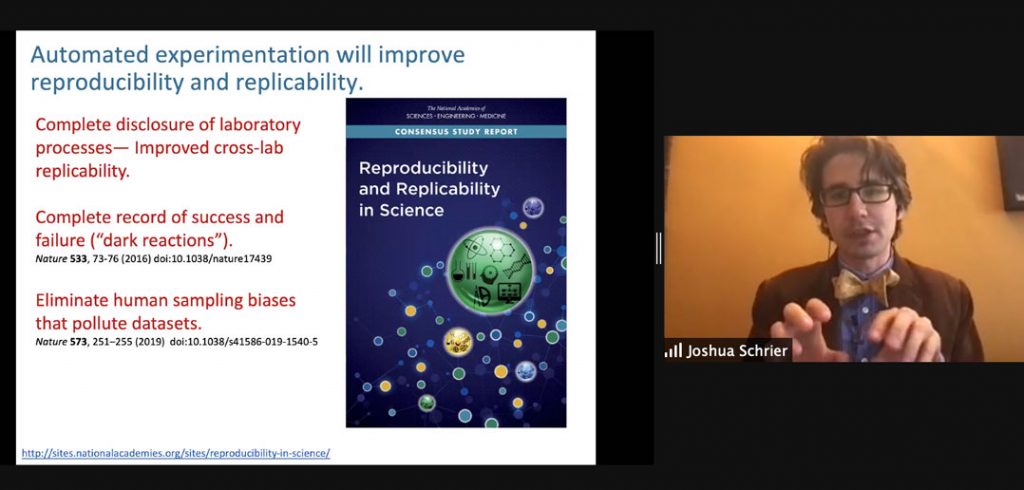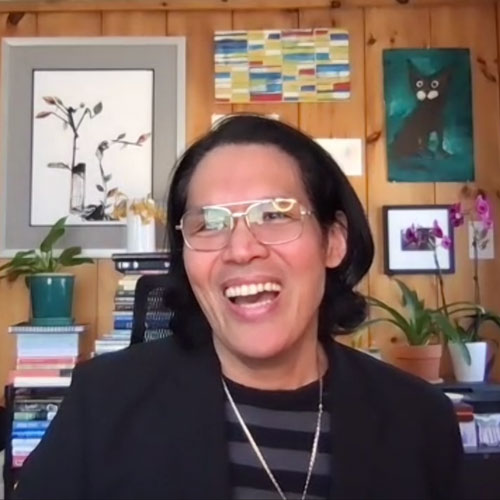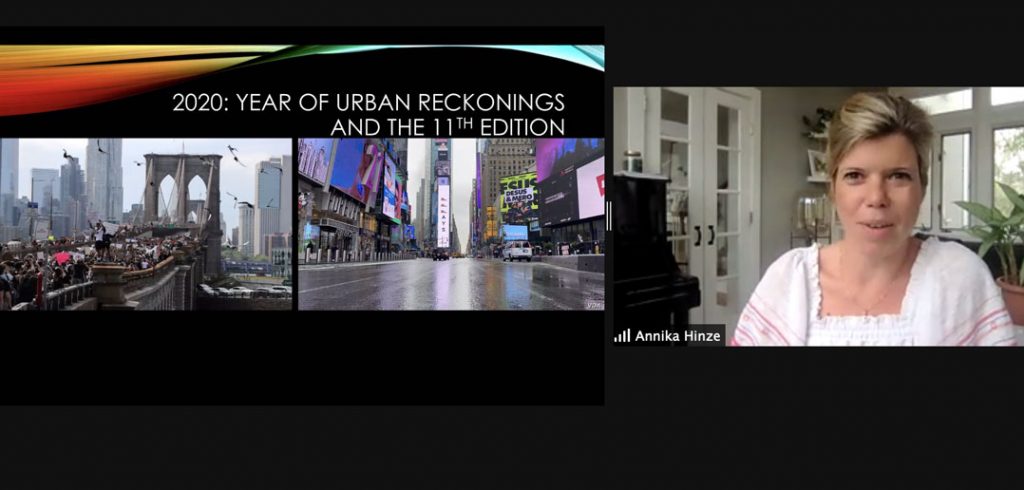From examining migration crises to expanding access to cybersecurity education, from exploring the history of Jews in New York to understanding how people deal with uncertainty, the work of Fordham faculty was highlighted on April 14 during a Research Day celebration.
“Today’s events are designed for recognition, celebration, and appreciation of the numerous contributors to Fordham’s research accomplishments in the past two years,” said George Hong, Ph.D., chief research officer and associate vice president for academic affairs.
Hong said that Fordham has received about $16 million in faculty grants over the past nine months, which is an increase of 50.3% compared to the same period last year.
“As a research university, Fordham is committed to excellence in the creation of knowledge and is in constant pursuit of new lines of inquiry,” said Joseph McShane, S.J., president of Fordham, said during the virtual celebration. “Our faculty continue to distinguish themselves in this area. Today, today we highlight the truly extraordinary breadth and depth of their work.”
Earning Honors
Ten faculty members, representing two years of winners due to cancellations last year from the COVID-19 pandemic, were recognized with distinguished research awards.
“The distinguished research awards provide us with an opportunity to shine a spotlight on some of our most prolific colleagues, give visibility to the research achievements, and inspire others to follow in their footsteps,” Provost Dennis Jacobs said.

Recipients included Yuko Miki, associate professor of history and associate director of Latin American and Latinx Studies (LALSI), whose work focuses on Black and indigenous people in Brazil and the wider Atlantic world in the 19th century; David Budescu, Ph.D., Anne Anastasi Professor of Psychometrics and Quantitative Psychology, whose work has been on quantifying, judging, and communicating uncertainty; and, in the junior faculty category, Santiago Mejia, Ph.D., assistant professor of law and ethics in the Gabelli School of Business, whose work examines shareholder primacy and Socratic ignorance and its implications to applied ethics. (See below for a full list of recipients).
Diving Deeper
Eleven other faculty members presented in their recently published work in the humanities, social sciences, and interdisciplinary studies.
Jews and New York: ‘Virtually Identical’
Images of Jewish people and New York are inextricably tied together, according to Daniel Soyer, Ph.D., professor of history and co-author of Jewish New York: The Remarkable Story of a City and a People (NYU Press, 2017).
“The popular imagination associated Jews with New York—food names like deli and bagels … attitudes and manner, like speed, brusqueness, irony, and sarcasm; with certain industries—the garment industry, banking, or entertainment,” he said. “
Soyer quoted comedian Lenny Bruce, who joked, “the Jewish and New York essences are virtually identical, right?”
Soyer’s book examines the history of Jewish people in New York and their relationship to the city from 1654 to the current day. Other presentations included S. Elizabeth Penry, Ph.D., associate professor of history, on her book The People Are King: The Making of an Indigenous Andean Politics (Oxford University Press, 2019), and Kirk Bingaman, Ph.D., professor of pastoral mental health counseling in the Graduate School of Religion and Religious Education, on his book Pastoral and Spiritual Care in a Digital Age: The Future Is Now (Lexington Books, 2018).
Focus on Cities: The Reality Beyond the Politics
Annika Hinze, Ph.D, associate professor of political science and director of the Urban Studies Program, talked about her most recent work on the 10th and 11th editions of City Politics: The Political Economy of Urban America (Routledge, 11th edition forthcoming). She focused on how cities were portrayed by the Trump Administration versus what was happening on the ground.
“The realities of cities are really quite different—we’re not really talking about inner cities anymore,” she said. “Cities are, in many ways, mosaics of rich and poor. And yes, there are stark wealth discrepancies, growing pockets of poverty in cities, but there are also enormous oases of wealth in cities.”
When the COVID-19 pandemic hit, Hinze’s latest edition will show how urban density did not contribute to the spread of COVID-19, as many people thought, but rather it was overcrowding and concentrated poverty in cities that led to accelerated spread..
Other presentations included Nicholas Tampio, Ph.D., professor of political science, on his book Common Core: National Education Standards and the Threat to Democracy (Johns Hopkins University Press, 2018); Margo Jackson, Ph.D., professor and chair of the division of psychological and educational services in the Graduate School of Education on her book Career Development Interventions for Social Justice: Addressing Needs Across the Lifespan in Educational, Community, and Employment Contexts (Rowman and Littlefield, 2019); and Clara Rodriguez, Ph.D., professor of sociology on her book America, As Seen on TV: How Television Shapes Immigrant Expectations Around the Globe (NYU Press, 2018).
A Look into Migration
In her book Migration Crises and the Structure of International Cooperation (University of Georgia Press, 2019), Sarah Lockhart, Ph.D. assistant professor of political science, examined how countries often have agreements in place to manage the flow of trade, capital, and communication, but not people. While her work in this book specifically focused on voluntary migration, it also had implications for the impacts on forced migration and the lack of cooperation among nations .
“I actually have really serious concerns about the extent of cooperation … on measures of control, and what that means for the future, when states are better and better at controlling their borders, especially in the developing world,” she said. “And what does that mean for people when there are crises and there needs to be that kind of release valve of movement?”
Other presentations included: Tina Maschi, Ph.D., professor in the Graduate School of Social Service, on her book Forensic Social Work: A Psychosocial Legal Approach to Diverse Criminal Justice Populations and Settings (Springer Publishing Company, 2017), and Tanya Hernández, J.D., professor of law on her book Multiracials and Civil Rights: Mixed-Race Stories of Discrimination (NYU Press, 2018).
Sharing Reflections

The day’s keynote speakers—Daniel Alexander Jones, professor of theatre and 2019 Guggenheim Foundation Fellow, and Tony Award winner Clint Ramos, head of design and production and assistant professor of design—shared personal reflections on how the year’s events have shaped their lives, particularly their performance and creativity.
For Jones, breathing has always been an essential part of his work after one of his earliest teachers “initiated me into the work of aligning my breath to the cyclone of emotions I felt within.” However, seeing another Black man killed recently, he said, left him unable to “take a deep breath this morning without feeling the knot in my stomach at the killing of Daunte Wright by a police officer in Minnesota.”
Jones said the work of theatre teachers and performers is affected by their lived experiences and it’s up to them to share genuine stories for their audience.
“Our concern, as theater educators, encompasses whether or not in our real-time lived experiences, we are able to enact our wholeness as human beings, whether or not we are able to breathe fully and freely as independent beings in community and as citizens in a broad and complex society,” he said.
Ramos said that he feels his ability to be fully free has been constrained by his own desire to be accepted and understood, and that’s in addition to feeling like an outsider since he immigrated here.
“I actually don’t know who I am if I don’t anchor my self-identity with being an outsider,” he said. “There isn’t a day where I am not hyper-conscious of my existence in a space that contains me. And what that container looks like. These thoughts preface every single process that informs my actions and my decisions in this country.”
Interdisciplinary Future
Both keynote speakers said that their work is often interdisciplinary, bringing other fields into theatre education. Jones said he brings history into his teaching when he makes his students study the origins of words and phrases, and that they incorporate biology when they talk about emotions and rushes of feelings, like adrenaline.
That message of interdisciplinary connections summed up the day, according to Jonathan Crystal, vice provost.
“Another important purpose was really to hear what one another is working on and what they’re doing research on,” he said. “And it’s really great to have a place to come listen to colleagues talk about their research and find out that there are these points of overlap, and hopefully, it will result in some interdisciplinary activity over the next year.”
Distinguished Research Award Recipients
Humanities
2020: Kathryn Reklis, Ph.D., associate professor of theology, whose work included a project sponsored by the Henry Luce Foundation on Shaker art, design, and religion.
2021: Yuko Miki, Ph.D., associate professor of history and associate director of Latin American and Latinx Studies (LALSI), whose work is on Black and indigenous people in Brazil and the wider Atlantic world in the 19th century.
Interdisciplinary Studies
2020: Yi Ding, Ph.D., professor of school psychology in the Graduate School of Education, who received a $1.2 million grant from the U.S. Department of Education for a training program for school psychologists and early childhood special education teachers.
2021: Sophie Mitra, Ph.D., professor of Economics and co-director of the Disability Studies Minor, whose recent work includes documenting and understanding economic insecurity and identifying policies that combat it.
Sciences and Mathematics
2020: Thaier Hayajneh, Ph.D., professor of computer and information sciences and founder director of Fordham Center of Cybersecurity, whose $3 million grant from the National Security Agency will allow Fordham to help Historically Black Colleges and Universities and Minority-Serving Institutions build their own cybersecurity programs.
2021: Joshua Schrier, Ph.D., Kim B. and Stephen E. Bepler Chair and professor of chemistry, who highlighted his $7.4 million project funded by the Defense Advanced Research Projects Agency on perovskites.
Social Sciences
2020: Iftekhar Hasan, Ph.D., university professor and E. Gerald Corrigan Chair in International Business and Finance, whose recent work has included the examination of the role of female leadership in mayoral positions and resilience of local societies to crises.
2021: David Budescu, Ph.D., Anne Anastasi Professor of Psychometrics and Quantitative Psychology, whose work has been on quantifying, judging, and communicating uncertainty.
Junior Faculty
2020: Asato Ikeda, Ph.D., associate professor of art history, who published The Politics of Painting, Facism, and Japanese Art During WWII.
2021: Santiago Mejia, Ph.D., assistant professor of law and ethics in the Gabelli School of Business, whose work focuses on shareholder primacy and Socratic ignorance and its implications to applied ethics.

